1 Comment
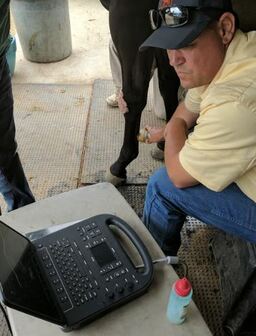 So you are thinking about getting another horse, or maybe you are getting your first horse. There are some things you should be aware of. First and foremost, THERE IS NO SUCH THING AS A FREE HORSE. When you decide to acquire a new horse it is always wise to do some sort of a pre-purchase exam. It doesn’t matter if you are purchasing a high end show horse, or you are looking for your child’s first trail horse. This exam can be as simple as a physical and soundness exam, to as involved as taking x-rays, doing ultrasound exams, or MRI, and pulling blood for testing. Whatever the horse or discipline, a pre purchase exam will allow you to know what kind of horse you are getting and what kind of maintenance if any you will need to do to keep your new horse sound and happy. The following article gives you an idea of how to proceed with a pre purchase exam and what information you should expect to gather from a pre purchase exam. Click Here to read article. 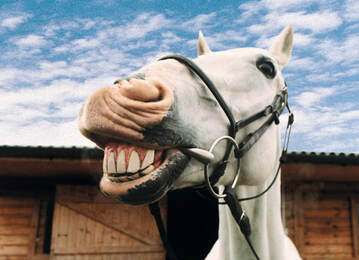 February is National Dental Awareness Month. Here is some great info on keeping your horse’s mouth healthy. Proper dental care is vital to your horse’s health and well-being. Dental pain and discomfort can cause lack of concentration, which can create performance problems. Improper contact between the teeth can also lead to inefficient chewing, weight loss, bit discomfort, excessive tooth wear, tooth abscesses, and the premature loss of teeth. Dental disease and problems arising in horses are sometimes mismanaged or even overlooked. The horse’s mouth should be checked every year on a routine basis in order to determine the health and vitality of the mouth. Find more information in the article below on the importance of caring for your horse’s mouth. Did you know . . . It’s not unusual to see horses with significant dental issues that perform and eat just fine! Some horses are just tough, and they simply adapt to their discomfort. What owners often find is that even if they didn't think they were having a problem, their horse is more relaxed and performs better after corrective dental procedures. Click to read: "The Importance of Maintaining the Health of your Horse's Mouth" 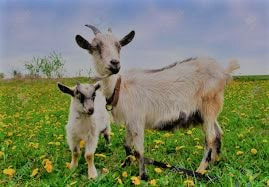 GOAT KIDDING, that is. For many new goat owners the prospect of kidding (giving birth) can be very daunting and even scary at times. There are 3 stages to labor; The first, being when the uterus begins to contract. At this stage the doe may separate herself from her herd, act uncomfortable and restless, lie down and urinate frequently. This stage can last from 2 - 12 hours. The second stage is the actual delivery of the kids. The first thing that you will see is the clear amniotic sac (or bubble) followed by the front feet of the kid with its head in between its front limbs and the kids should present upright (kid's spine closest to the doe's spine). The second stage of labor should progress quickly and be completed in 1 - 2 hours. The all important question is... "When do we call the vet?" Here are some good guidelines to follow for when to call Temecula Creek Veterinary; - If the female strains for 1 hour and no kid is seen - If a kid does not appear to be presented correctly - If the doe is in distress The third and final stage of labor is the passing of the placenta. The placenta should be passed within 6 hours. After passage of the placenta there will be normal lochia (reddish-brown discharge). If the placenta is not passed after 12 hours, contact Temecula Creek Veterinary. The doe will lick the kids and stimulate them to breathe at which time they will begin to cry. You many clean out the mucous and fluids from their nose and mouth to assist them to breathe and stimulate them by rubbing them with a warm towel if necessary. Kids should be nursing within an hour after birth, this milk is the most important as it is colostrum which the kids will need to receive antibodies from their mother. Once the umbilical cord tears (do not cut it, they will tear on their own), they should be dipped in an appropriate antiseptic solution, such as diluted chlorhexidine/Novalsan, to prevent infection. If the kids are acting abnormal in any way, or are unable to suckle then contact Temecula Creek Veterinary immediately. Finally, don't forget to take in nature's beautiful process of kidding out! 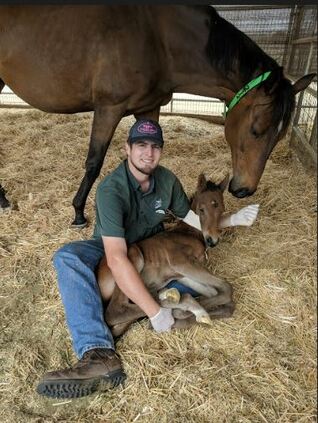 With foaling season upon us I thought it would be good to give everyone a refresher on what to expect when your mare is expecting. Whether you bred your mare last year, purchased a pregnant mare, or rescued a pregnant mare. You will all be anxiously waiting and watching for the time when she will foal. This can be exciting and frustrating all at the same time. It is also important to know what is normal and what is abnormal in the foaling process, and when to call your veterinarian, and when not to call your veterinarian. Many of you will stay up for weeks on end every night waiting for this wonderful event only to miss it because at 3am you had to go into the house for a cup of coffee. Some of you will witness this event first hand and be amazed at the process the mare goes through. Either way our goal is to have a healthy foal and mare. Although there are many things that can go wrong during foaling, you will find that nature usually gets it right. The following article explains and describes the normal process of foaling. If you know what normal should be, it will help you to identify when there is a problem and when you should call your veterinarian for assistance. Read the article below to better prepare for a safe & successful foal deliver: https://aaep.org/horsehealth/foaling-mare-newborn-preparing-safe-successful-foal-delivery The horses can be so lame that owners will think that the horse may have a fracture. Hoof abscesses are very painful for the horse. It would be like having a blood blister under your toe nail, and then having to walk around on it. Some causes of abscesses may be due to a lack of cleaning out the foot in a muddy environment, overgrown sole trapping debris, a newly trimmed foot which leaves the foot more open to packing in bacteria from the environment, nail holes from shoes which weaken the hoof wall, or foot injuries such as bruising. Hoof abscesses are usually easily treated and heal quickly. Once the abscess is located and drained the horse feels immediate relief. However there are some abscesses that may be deep in the foot and cannot be opened up immediately. These may take time soaking the foot, and possibly poultice for up to 2 weeks. Please see the article below for a more in-depth look at hoof abscesses and how you can recognize, treat, and prevent them.
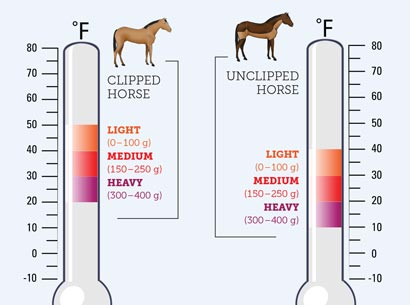 It's getting cold outside and we are getting a lot of questions about when/if clients should blanket their horses. Horses with a full winter coat can regulate their temperature very well even in colder weather. Many people will body clip their horses in order to keep riding them during the winter months. They do this in order to keep them from overheating during work or coming out of work overly sweaty. If you choose to body clip your horse, they will need to be blanketed at warmer temperatures, compared to those horses with a full winter coat. The image below is a great general guideline for owners to follow (keep in mind that these are daytime temperatures, not overnight lows) Each horse is unique and may react to temperatures differently. If you have any concerns about your animal and its specific requirements (i.e. based on weight, age, or other medical concerns), call our office today so one of our Veterinarians can consult with your individually. 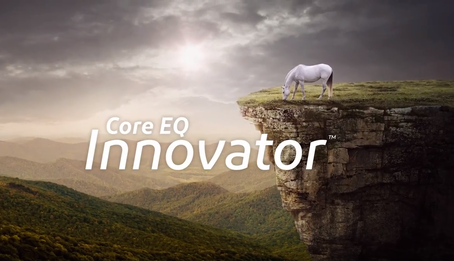 This year at Temecula Creek Equine, we are using the new Core EQ vaccine from Zoetis. This vaccine is the 4 way vaccine we have been using however it has the added benefit of including Rabies in the vaccine which is one of the core vaccines recommended by the AAEP. Many of you may be asking why would we include Rabies as part of the core vaccines if there is not a high incidence of Rabies in horses in this area? The reality is that although we may not have a high incidence of Rabies in horses in this area, we do have movement of horses into and out of the areas where Rabies is more prevalent. Since Rabies is 100% fatal if contracted it is wise to make sure your horses are protected. In addition to the horses being protected against Eastern and Western Encephalitis, Tetanus and West Nile and Rabies, Zoetis will continue to offer their vaccine support guarantee. This means that if your horse exhibits any clinical signs of the diseases we vaccinate your horse for, Zoetis will pay for any diagnostic testing to determine if your horse is affected by these diseases. If it turns out that your horse is affected by the disease it was vaccinated for, Zoetis will pay for treatment of your animal up to $5,000. The vaccinations must be Zoetis and be given by a veterinarian for this added protection. This not only ensures that your horse is protected, but it gives you peace of mind that they will stand behind their product and assist you and your horse should your horse become ill. 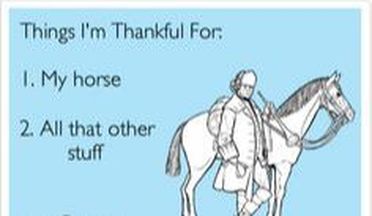 As I was contemplating what I should write about for this post, I thought about something that we all need to be reminded about every year. Its not a disease, or some condition that horses suffer from, but the fact that all of us need to be reminded about what we are truly thankful for. Thanksgiving is tomorrow, and I was thinking about the things that I am thankful for. The three things that immediately came to my mind were God, family, and friends. I am grateful everyday that I am able to work with people and their animals. I am grateful for a loving and supportive family that stands by me everyday. I am grateful that all of you trust me to be apart of the health of your horses and animals, and I am grateful for the great friendships that have been formed over the years because of the common interests of caring for animals, that we share. As we enter this holiday season I would remind each of us to take a moment and remember the things that we are truly thankful for. Even during the tough times, or in times of trial, we can still find something to be thankful for. At Temecula Creek Equine, would like to wish all of you a Happy Thanksgiving, from our family to yours. 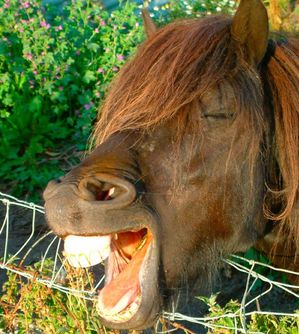 Is your horse losing weight or dropping feed? When was the last time they had a dental??? We get our teeth cleaned 1-2 times yearly, and our horse friends also need their teeth checked and floated, usually at least once a year! Horse teeth are continuously erupting so they need regular care to prevent problems early on. Dental pain and discomfort can cause lack of concentration, which can create performance problems. Give us a call today to get a dental and oral examination scheduled with one of our amazing vets! |
Archives
April 2019
Categories |
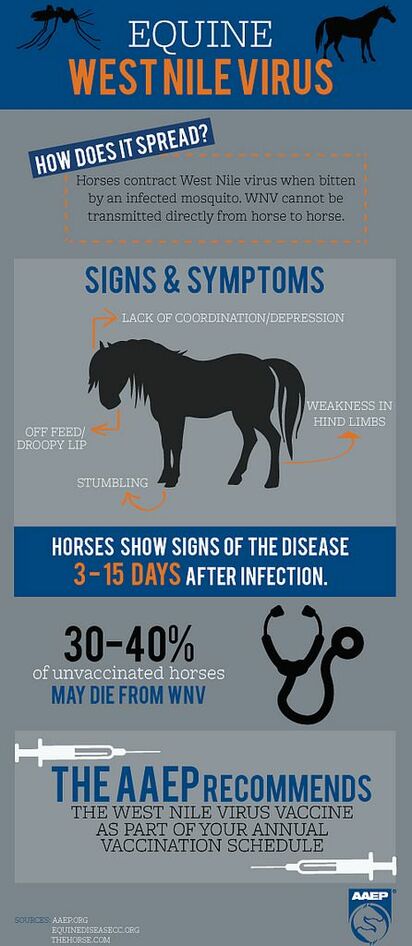
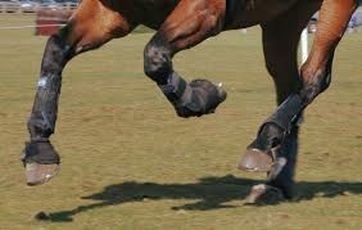
 RSS Feed
RSS Feed